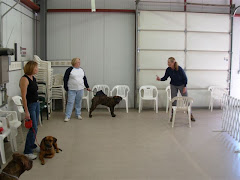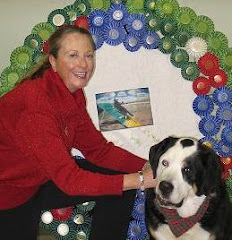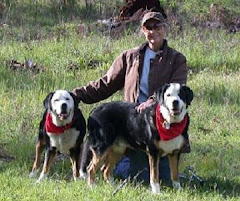 Mention "bloat," and some dog owners will snicker. They'll think of their gas-passing doberman, or their overweight chihuahua, or the time their Lab got into the food bin and ate himself round.
Mention "bloat," and some dog owners will snicker. They'll think of their gas-passing doberman, or their overweight chihuahua, or the time their Lab got into the food bin and ate himself round.To folks whose dogs have suffered from true clinical bloat, however, it's no laughing matter. Bloat occurs when the dog ingests a mix of too much air, water and food. The stomach swells and is unable to sufficiently relieve the pressure. As if this weren't painful enough, the stomach can rotate, which twists everything shut. The condition is then called GDV (gastric dilitation volvulus). Nothing can pass through, including blood and oxygen. Unless the dog gets emergency surgery within minutes, the dog will die in excruciating pain.
While any dog can suffer from GDV, it's more prevalent in deep-chested breeds like Danes, Weimeraners, Labs, dobermans, German shepherd dogs, and Greater Swiss Mountain Dogs. Small dogs like pugs can't be ruled out either.
Here's the good news: you don't have to wait for a life-threatening situation. An increasing number of progressive vets are encouraging prophylactic (preventive) gastropexy, especially for the high-risk breeds. It makes much ore sense to do a minimally invasive surgery on a young, healthy dog, so the ideal time for a prophylactic gastropexy is when the young dog is already under anesthesia for spaying or neutering. The cost of this surgery can be as low as $200.
 |
| Angus shows off his scar |
 The procedure was relatively simple, at least for our Purdue alumnus vet. She took a small piece of the outside of Angus' stomach and threaded it through a slit in his abdominal wall. She tacked it with dissolving sutures. By the time the sutures have dissolved, adhesions have taken over, holding the stomach in place with a natural strength. Angus came through the surgery with flying colors and was restricted in his activities for about 10 days while staples held his healing tummy incision together.
The procedure was relatively simple, at least for our Purdue alumnus vet. She took a small piece of the outside of Angus' stomach and threaded it through a slit in his abdominal wall. She tacked it with dissolving sutures. By the time the sutures have dissolved, adhesions have taken over, holding the stomach in place with a natural strength. Angus came through the surgery with flying colors and was restricted in his activities for about 10 days while staples held his healing tummy incision together. Talk to your vet about a prophylactic gastropexy (or just ask about a "preventive pexy.") If your dog is a candidate, this procedure will offer peace of mind for you and possibly a longer life for your dog.
Signs your dog may be bloating:
- Stomach is distended
- Dog gulps at air
- Dog desperately licks and gulps at anything--grass, fabric, plastic
- Dog is agitated...can't sit, can't lie down, can't get comfortable
- Dog tries to vomit and defecate, but passes little or nothing
- Dog acts both despondent and desperate
Risk factors:
- genetics
- family history
- high energy level, bolts his food
- high stress


















No comments:
Post a Comment